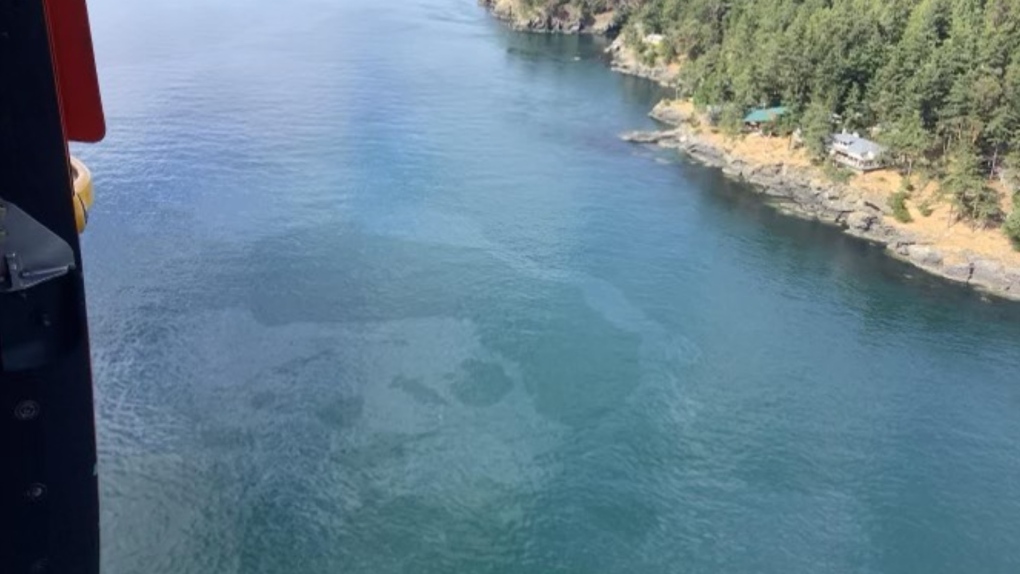U.S. authorities working to keep orcas away from 'pollution incident' off Vancouver Island
 The U.S. Coast Guard and other American agencies are responding to a sunken vessel leaking fuel in Haro Strait, between Vancouver Island and San Juan Island. (Twitter/@USCGPacificNW)
The U.S. Coast Guard and other American agencies are responding to a sunken vessel leaking fuel in Haro Strait, between Vancouver Island and San Juan Island. (Twitter/@USCGPacificNW)
The U.S. Coast Guard and other agencies are responding to a sunken vessel leaking fuel in Haro Strait, between Vancouver Island and San Juan Island.
The U.S. Coast Guard's Pacific Northwest district tweeted around 6 p.m. Saturday that a roughly 15-metre (49-foot) fishing vessel had sunk west of San Juan Island's Sunset Point.
The vessel had more than 9,800 litres (2,600 gallons) of diesel and oil on board, according to the U.S. Coast Guard, which described the situation as a "pollution incident."
"All crew were rescued by (a) Good Samaritan," the agency said.
An aerial image of the area shows a sheen on the water where the vessel sank.
The cause of the sinking wasn't immediately known. The ship, called the Aleutian Isle, reported it was taking on water about 2 p.m. Saturday, the Coast Guard said.
Coast Guard Sector Puget Sound said personnel spotted an oil sheen about 2.4 kilometres (1.5 miles) in length at around 5 p.m. Saturday.
Some of the sheen had entered nearby Canadian waters, Petty Officer Michael Clark said Sunday.
The Coast Guard was working with the Canadian Coast Guard Regional Operations Centre, the San Juan County Office of Emergency Management, Washington State Department of Ecology and the non-profit Islands' Oil Spill Association on Sunday to contain and recover the spill, Clark said.
In an update Saturday evening, the USCG said it is working with Sound Watch and the National Oceanic and Atmospheric Administration to monitor the location of southern resident killer whales and keep them away from the spill if necessary.
"While there are not any whales currently in the area, our agencies are prepared to deploy authorized deterrents," the agency said.
Most of those "authorized deterrents" are sound-based, according to the NOAA website.
Among the strategies authorities use to keep whales away from fuel spills are "helicopter hazing," which involves flying at low altitudes to create sound and disturb the surface of the water in an effort to make the whales move away; striking underwater pipes with a hammer to make a loud noise; and using "underwater firecrackers" for a similar purpose.
San Juan Island is about 144 kilometres (90 miles) north of Seattle and 25.6 kilometres (16 miles) east of Victoria, B.C.
"We are working with government and industry partners to ensure an efficient and effective containment and recovery response," U.S. Coast Guard Lt. Cmdr. Brian Dykens said in a statement.
"The local public, the environment and protected marine species are our top priority."
With files from The Associated Press
CTVNews.ca Top Stories

From essential goods to common stocking stuffers, Trudeau offering Canadians temporary tax relief
Canadians will soon receive a temporary tax break on several items, along with a one-time $250 rebate, Prime Minister Justin Trudeau announced Thursday.
She thought her children just had a cough or fever. A mother shares sons' experience with walking pneumonia
A mother shares with CTVNews.ca her family's health scare as medical experts say cases of the disease and other respiratory illnesses have surged, filling up emergency departments nationwide.
Trump chooses Pam Bondi for attorney general pick after Gaetz withdraws
U.S. president-elect Donald Trump on Thursday named Pam Bondi, the former attorney general of Florida, to be U.S. attorney general just hours after his other choice, Matt Gaetz, withdrew his name from consideration.
A one-of-a-kind Royal Canadian Mint coin sells for more than $1.5M
A rare one-of-a-kind pure gold coin from the Royal Canadian Mint has sold for more than $1.5 million. The 99.99 per cent pure gold coin, named 'The Dance Screen (The Scream Too),' weighs a whopping 10 kilograms and surpassed the previous record for a coin offered at an auction in Canada.
Putin says Russia attacked Ukraine with a new missile that he claims the West can't stop
Russian President Vladimir Putin announced Thursday that Moscow has tested a new intermediate-range missile in a strike on Ukraine, and he warned that it could use the weapon against countries that have allowed Kyiv to use their missiles to strike Russia.
Here's a list of items that will be GST/HST-free over the holidays
Canadians won't have to pay GST on a selection of items this holiday season, the prime minister vowed on Thursday.
Video shows octopus 'hanging on for dear life' during bomb cyclone off B.C. coast
Humans weren’t the only ones who struggled through the bomb cyclone that formed off the B.C. coast this week, bringing intense winds and choppy seas.
Taylor Swift's motorcade spotted along Toronto's Gardiner Expressway
Taylor Swift is officially back in Toronto for round two. The popstar princess's motorcade was seen driving along the Gardiner Expressway on Thursday afternoon, making its way to the downtown core ahead of night four of ‘The Eras Tour’ at the Rogers Centre.
Service Canada holding back 85K passports amid Canada Post mail strike
Approximately 85,000 new passports are being held back by Service Canada, which stopped mailing them out a week before the nationwide Canada Post strike.

































